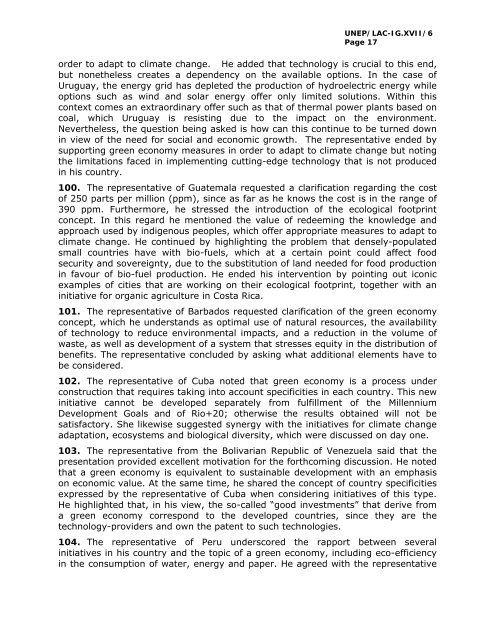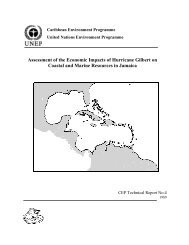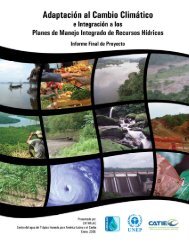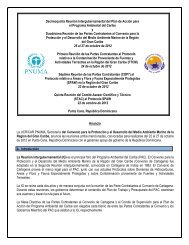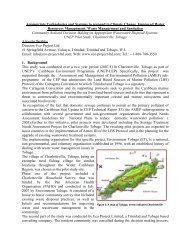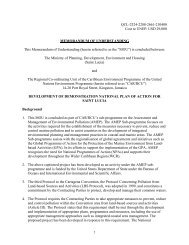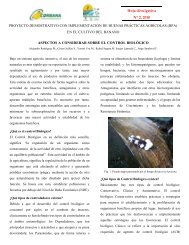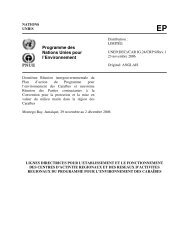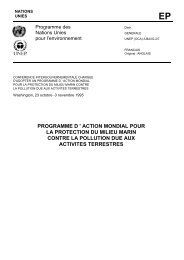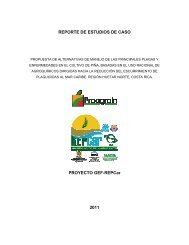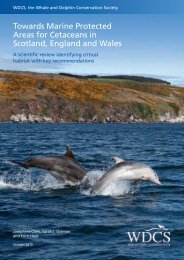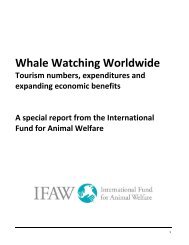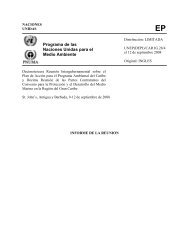English - Programa de Naciones Unidas para el Medio Ambiente
English - Programa de Naciones Unidas para el Medio Ambiente
English - Programa de Naciones Unidas para el Medio Ambiente
- No tags were found...
Create successful ePaper yourself
Turn your PDF publications into a flip-book with our unique Google optimized e-Paper software.
UNEP/LAC-IG.XVII/6Page 17or<strong>de</strong>r to adapt to climate change. He ad<strong>de</strong>d that technology is crucial to this end,but noneth<strong>el</strong>ess creates a <strong>de</strong>pen<strong>de</strong>ncy on the available options. In the case ofUruguay, the energy grid has <strong>de</strong>pleted the production of hydro<strong>el</strong>ectric energy whileoptions such as wind and solar energy offer only limited solutions. Within thiscontext comes an extraordinary offer such as that of thermal power plants based oncoal, which Uruguay is resisting due to the impact on the environment.Neverth<strong>el</strong>ess, the question being asked is how can this continue to be turned downin view of the need for social and economic growth. The representative en<strong>de</strong>d bysupporting green economy measures in or<strong>de</strong>r to adapt to climate change but notingthe limitations faced in implementing cutting-edge technology that is not producedin his country.100. The representative of Guatemala requested a clarification regarding the costof 250 parts per million (ppm), since as far as he knows the cost is in the range of390 ppm. Furthermore, he stressed the introduction of the ecological footprintconcept. In this regard he mentioned the value of re<strong>de</strong>eming the knowledge andapproach used by indigenous peoples, which offer appropriate measures to adapt toclimate change. He continued by highlighting the problem that <strong>de</strong>ns<strong>el</strong>y-populatedsmall countries have with bio-fu<strong>el</strong>s, which at a certain point could affect foodsecurity and sovereignty, due to the substitution of land nee<strong>de</strong>d for food productionin favour of bio-fu<strong>el</strong> production. He en<strong>de</strong>d his intervention by pointing out iconicexamples of cities that are working on their ecological footprint, together with aninitiative for organic agriculture in Costa Rica.101. The representative of Barbados requested clarification of the green economyconcept, which he un<strong>de</strong>rstands as optimal use of natural resources, the availabilityof technology to reduce environmental impacts, and a reduction in the volume ofwaste, as w<strong>el</strong>l as <strong>de</strong>v<strong>el</strong>opment of a system that stresses equity in the distribution ofbenefits. The representative conclu<strong>de</strong>d by asking what additional <strong>el</strong>ements have tobe consi<strong>de</strong>red.102. The representative of Cuba noted that green economy is a process un<strong>de</strong>rconstruction that requires taking into account specificities in each country. This newinitiative cannot be <strong>de</strong>v<strong>el</strong>oped se<strong>para</strong>t<strong>el</strong>y from fulfillment of the MillenniumDev<strong>el</strong>opment Goals and of Rio+20; otherwise the results obtained will not besatisfactory. She likewise suggested synergy with the initiatives for climate changeadaptation, ecosystems and biological diversity, which were discussed on day one.103. The representative from the Bolivarian Republic of Venezu<strong>el</strong>a said that thepresentation provi<strong>de</strong>d exc<strong>el</strong>lent motivation for the forthcoming discussion. He notedthat a green economy is equivalent to sustainable <strong>de</strong>v<strong>el</strong>opment with an emphasison economic value. At the same time, he shared the concept of country specificitiesexpressed by the representative of Cuba when consi<strong>de</strong>ring initiatives of this type.He highlighted that, in his view, the so-called “good investments” that <strong>de</strong>rive froma green economy correspond to the <strong>de</strong>v<strong>el</strong>oped countries, since they are thetechnology-provi<strong>de</strong>rs and own the patent to such technologies.104. The representative of Peru un<strong>de</strong>rscored the rapport between severalinitiatives in his country and the topic of a green economy, including eco-efficiencyin the consumption of water, energy and paper. He agreed with the representative


